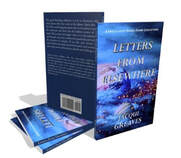We love reading speculative fiction. According to Wikipedia – if we ignore religious texts (I have thoughts), comics and textbooks, and add Tolkien’s Lord of the Rings (reportedly over 120 million copies sold in different formats) – 5 of the 8 best-selling books of all time are speculative fiction (and, yes, this is a western-centric assessment).
When we engage with speculative fiction, we’re not just entertained, we’re taken on a journey into the unknown. It allows us to indulge our desire for the extraordinary. It’s an invitation to dream and question.
Speculative fiction offers us an opportunity to interrogate the real world from a safe distance. We can investigate what it means to be human. Most of the stories in ‘Letters From Elsewhere’, my collection of speculative short stories, explore what it means to be monstrous. What better way to do that than from the perspective of a so-called monster. Who was more monstrous – Mary Shelley’s Dr Frankenstein or the monster the he created?
Another favourite character of mine, who offers a unique perspective on humanity, is the cyborg, Murderbot (The Murderbot Diaries by Martha Wells). Much of Murderbot’s understanding of humanity comes from streaming soap operas, but when they work alongside actual living humans the reality is quite different. Through internal, and often comedic, dialogue, Murderbot provides a running commentary on the dangers of human emotions and how they compromise our motives and behaviours.
Through speculative fiction, we can hold a mirror up to ourselves in a manner that isn’t dangerous or confronting but gets to the truth of who we are. It allows us to confront our deepest fears, desires, hopes and wildest dreams from within the safety of fictitious construct.
Think of how ground-breaking ‘The Left-Hand of Darkness’ (Ursula le Guin) was in challenging the concept of binary sexuality, and ‘The Handmaid’s Tale’ (Margaret Atwood) was in exploring the rise of fundamentalism. Both books brutally critiqued society. That’s what speculative fiction can do.
Sometimes, the answer to ‘What if?’ isn’t happy. I wrote ‘Rose Moon’ in response to the election of Trump as President of the USA. I imagined a human world darkened by repression, cruelty, environmental damage, and religious extremism – tragically, that didn’t turn out to be the speculative component of the novella!
In the upcoming ‘Ghost Assassins of Bijou’ collection of novellas, I’m delving into misogyny, repression and the patriarchy. To lighten the tone, I’m telling the stories in the form of a Space Opera with humour woven through the prose. The messages are no less confronting, they’re just delivered in a more palatable package.
In speculative fiction, we can imagine how different environments, technologies, or societies might alter the human experience. Speculative fiction can foster discussion about socio-political issues, encourage diverse thinking and offer concepts for technological innovation. Submarines, space travel, computers, cell phones and virtual reality all featured in speculative fiction before existing in reality.
Speculative fiction taps into our curiosity about the future, the supernatural, and the abstract possibilities that lie just beyond our reach. It’s also fun!

 RSS Feed
RSS Feed